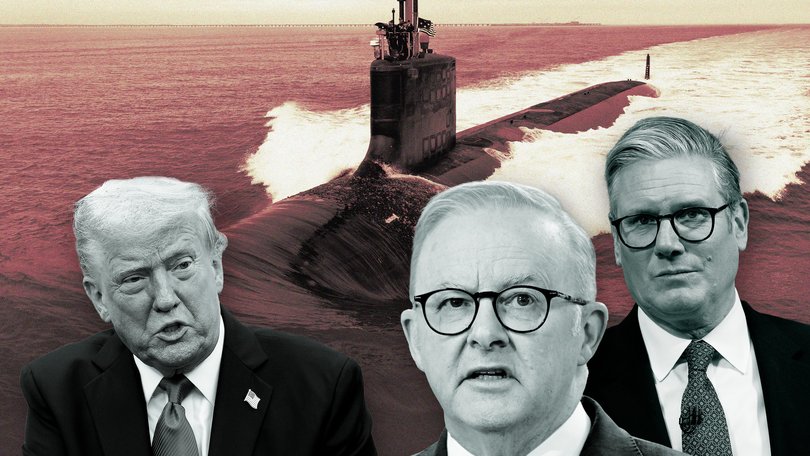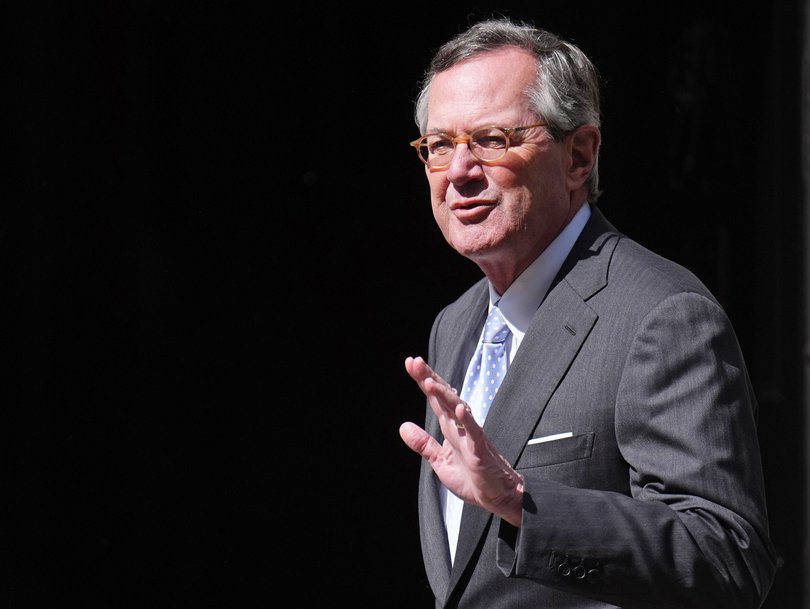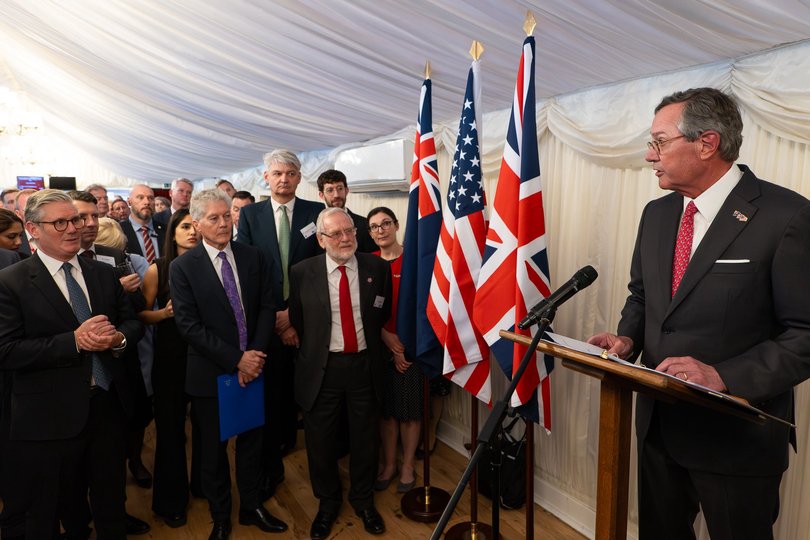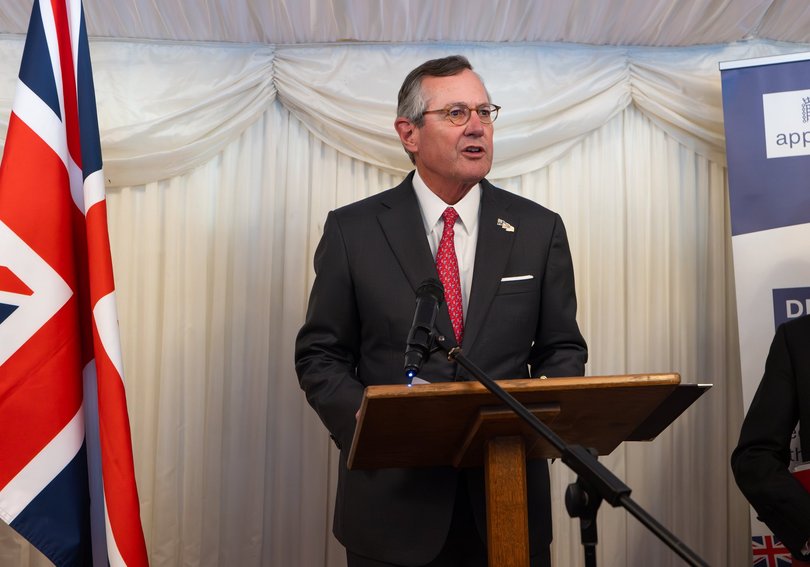LATIKA M BOURKE: ‘Alive and kicking’, what a high-powered event in London said about AUKUS
LATIKA M BOURKE: A high-powered event in London, full of incredibly influential officials, including a senior Trump Administration official, has given a clear indication on the future of AUKUS.

The word “bipartisan” is one that rarely falls from the lips of anyone in the Trump Administration, or a Make America Great Again (MAGA) acolyte in 2025.
But it was the only word that Donald Trump’s freshly minted man in London, Ambassador Warren Stephens, wanted to stress when he stood before a packed room of MPs, Members of the House of Lords, diplomats, cabinet ministers, former Australian Cabinet Ministers and the UK Prime Minister Sir Keir Starmer.
“I want to emphasise the word bipartisan,” Mr Stephens told the crowd.
Sign up to The Nightly's newsletters.
Get the first look at the digital newspaper, curated daily stories and breaking headlines delivered to your inbox.
By continuing you agree to our Terms and Privacy Policy.“I am sure that you all are aware that bipartisanship is certainly not always the case in American politics these days.
“However, it is when it comes to AUKUS.”

These were not just one-off comments, or like US President Donald Trump is prone to do, made only to be reversed days, if not hours, later.
The US Ambassador doubled down when he met Sir Keir for his first official visit on Friday, stressing AUKUS as his priority, behind only the UK-US trade arrangement just signed.
It is hefty and welcome support.
“The US Ambassador to the UK comments are exceptionally reassuring,” Peter Dean, Director, Foreign Policy and Defence at the United States Studies Centre, said.
“Add this to the very strong support vocalised by Secretary Hegseth and Secretary (and National Security Security Advisor) Rubio and confirmation that Prime Minister Albanese that he has spoke directly to President Trump on AUKUS means that high level support for the trilateral technology pact seems rock solid with the senior leadership.”
But he said while the plan to buy the nuclear submarines was making “steady progress,” the second part of AUKUS — to build new weapons and advanced technological capabilities together was still vague.
“The proof now will come in the continued execution of AUKUS,” he said.
While Australia’s Defence Minister Richard Marles travelled to Washington DC soon after President Trump’s inauguration and secured a verbal endorsement from his counterpart, Defence Secretary Pete Hegseth, for the $368 billion program, doubts have always lingered about how deep support within the Administration truly runs.
This was exacerbated when President Trump himself appeared to not know what AUKUS was when asked about it in the Oval Office earlier this year, during Sir Keir’s visit to the White House.
But on AUKUS’ side has always been the strong support from House and Senate Democrats and Republicans, a bipartisanship shared in Australia and increasingly visibly in the UK, where the Labour Prime Minister, Sir Keir, has emerged as a born-again AUKUS groupie.
In Westminster, the All-Party Parliamentary Group (APPG) for AUKUS has swelled its ranks of MPs and Members of the House of Lords since Labour’s election win last year.
The APPG held its annual reception on Monday, so over-subscribed was the event sitting MPs who were members were turned away.
At exactly the same time, the APPG was meeting in London, the MPs who make up the House of Commons Defence Select Committee inquiring into how to better leverage AUKUS, were in DC on a fact-finding mission.
The blockbuster gathering in the Parliamentary Estate turned out to be a night not to miss.
The terrace space booked alongside the River Thames was only supposed to accommodate around 150 people, and 400 RSVPed. One hour in, MPs who were members of the APPG were turned away from entering the red-carpeted Cholmondeley Room.

The room became as hot as it was packed. The guest list was top tier, with the UK’s Defence Secretary John Healey mingling with the crowd that also included two former defence ministers from Australia, as well as former Treasurer Joe Hockey.
But as the instruction went around to room to make a path, it became clear more star power was to come. In strode Sir Keir, who had just faced his most torrid session of the Parliamentary Labour Party (PLP) meeting of his prime ministership.
In a heated session, many of his MPs challenged him over his decision to strip pensioners of their winter energy rebates, the plan to overhaul benefits to prevent their overuse and abuse and his Nigel Farage-like language on migrants.
It had not been an easy day. Before that, his team had been up until 3am thrashing out the text of a deal with the European Union aimed at smoothing out the post-Brexit relationship.
When the prime minister hosted the EU Commission President, Ursula von der Leyen, at Lancaster House later, they faced even more hostile questions from the media over the deal, which the Leave press depicted as a betrayal and surrender to Brussels.

Many a prime minister could easily have justified cancelling a dinner-time visit to the Lords to speak about a long-term submarine project for a country far away, as Australia often likes to depict itself.
But Sir Keir did not, and in his most expansive comments on national security and AUKUS so far, it became clear this was no box-ticking exercise.
“At the heart of the EU deal we signed … was, of course, the partnership on defence and security, which is so important in the context of the discussion we are having today here,” Sir Keir said.
He described the “sheer number of people” in the room as a “beating heart of the AUKUS caucus”, before questioning out loud how that sentence looked on paper compared to sounded when said.
“I don’t know who wrote that,” he quipped.
But Sir Keir, who in February pledged to raise the UK’s defence spending to 2.5 per cent of GDP within two years, said AUKUS was part of a far bigger story.
“For many months now, we’ve been saying we’re in a new era when it comes to defence and security — and we surely are,” he said.
“And that has got to translate from words to actions to initiatives.”
He said the boost to defence spending, which aims to reach 3 per cent of GDP in the next decade, was the result of the “biggest shift in my mindset.”
Sir Keir, who made almost no comments on national security and foreign policy before his election, bar supporting NATO and Ukraine, said that national security was now the central organising principle of his government.
“The first thought, if you like, in the morning and the last thought at night,” he said.
“The pillar on which everything else stands or falls.
“And this has got to be our collective endeavour from now on, with absolute clarity and national effort.
“We’ve talked about the peace dividend for some time, we’ve now got to talk about the defence dividend.
“This is vital work … and AUKUS is, of course, central to this.”
He hailed the “transformational investment in our collective security” and described AUKUS as being at the heart of the bonds between Australia, the UK and the United States.
“And it shows that when we talk about security and stability, we mean it, in the Indo-Pacific and here at home … really critical to our national security and our leading role in NATO,” he said.
“These are not just warm words because we’re matching them with investment in the most advanced military, scientific and technological capabilities to deliver together.
“I’m personally deeply committed to AUKUS, to realise the benefits that it brings.”
He said his newly created special representative for AUKUS position, filled by the UK’s former national security adviser Stephen Lovegrove, was a demonstration of his personal resolve.
“It actually demonstrates the seriousness with which we take this project, the vitalness with which we take this project.”
If he had had a difficult time in the PLP just hours prior, the reception by the “AUKUS caucus” couldn’t have been more different. The applause was strong and swift.
Mr Stephens put the metaphorical icing on the cake when he gave it not just fresh backing from the Trump Administration but also embraced the fact that it was also backed by Democrats.
Mr Trump has been on a mission to junk much of former President Joe Biden’s legacy since retaking the White House, but AUKUS appears safe from MAGA’s retribution.
Mr Stephens said it was “reassuring to see that same support” in the UK that existed in the United States.
“Because AUKUS is a partnership built on trust, and the United States is proud to stand alongside Britain and Austarlia as we deepen our collaboration to respond to a changing world,” he said.
“Thank you for allowing me to share these bipartisan viewpoints,” he concluded.
While Ambassador Stephens’ comments were the first on the record about AUKUS, they were not the first he had made during his short time in London.
Days prior, Kevin Rudd, Australia’s Ambassador to the United States and former prime minister, visited the UK and co-hosted Mr Stephens with a string of Indo-Pacific diplomats in London.
It was evidently an effective visit.
John Woodcock, now a Lord, co-chairs the APPG. He told The Nightly that the top-level interventions were as significant as they were welcome.
“This showed the strongest possible signal that AUKUS is alive and kicking, and is the future of our combined security,” Lord Walney said.
“You had the Prime Minister, and the defence secretary from the UK side on one of the busiest political days, maybe of the whole parliamentary term, and you’ve had the new US ambassador choosing AUKUS as his first public engagement and giving such a clear signal that the new US Administration is absolutely behind this,” he said.
“Coupled, of course, with the clear, ongoing support from the re-elected Australian government.
“So, it is all systems go to make this work now.”
